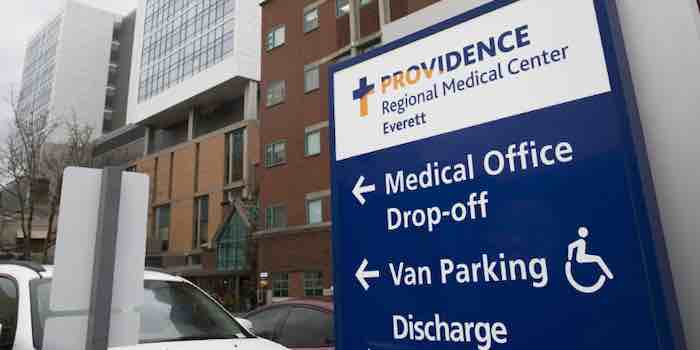By Lee Cary ——Bio and Archives--May 25, 2020
American Politics, News | CFP Comments | Reader Friendly | Subscribe | Email Us
 Review of Part 1 Takeaways
Review of Part 1 Takeaways
"While health officials stress that the likelihood of the novel coronavirus spreading in the U.S. and Washington is relatively low, anyone who has traveled from Wuhan, China should monitor their symptoms and contact their health care provider if they experience fever, cough or shortness of breath. Symptoms can present themselves in as few as two days or as long as two weeks after exposure, according to the CDC. Risk to the general public is still low, however."Compare the CDC's threat assessment concerning the "novel coronavirus" to what Spokane County Health Officer Dr. Bob Lutz said in a May 7 on-line interview with the Spokesman-Review's healthcare reporter who wrote the piece quoted above. The topic was the current situation and the future with regard to the pandemic in Spokane and the region.
Support Canada Free Press

Lutz: (9:18) "We were very ill prepared at the federal level, which, again, has really hampered us at the state level, and therefore at the local level to really proceed and to really address the pandemic in a way that we really could have and or should have." Reporter: "…when did you really start reading about Covid-19 in other parts of the world and start to get concerned, and I'm curious if you started sounding alarms in our health district here and started preparing here, when did that thought process begin with you and started to affect your work?" Lutz: (10:05) "The first awareness we had in the United States was soon, you know, late December – early January, and I think to Department of Health's credit, as you know, was it in in the media a week ago, a week and a half ago, they noted that they had essentially been monitoring Covid-19 for over 100 days. We did not have formal recognition of monitoring, but with that said, anybody who was in public health following infectious disease, epidemiology, health officers, we were well aware of the fact that an epidemic which was certainly in the making in China was, without doubt, going to move to the United States. And as it did, we were quickly monitoring it. So I think, that to our credit, we actually did have an incident command structure, we had that incident command set up in, I wanna say, late January – early February, and we were meeting…and then, obviously, when the very first case developed in Washington State, that really raised everybody's awareness. So, we saw it coming. We were very much concerned about it. Were we prepared? Internally, we had done enough preparation, we had plans in place…(11:35) But overall I would say that it's been challenging because the preparation, really not so much locally, and not so much at the state level, but preparedness was really not to the degree that it should have been."Lutz clearly believes the big federal health agencies downplayed the threat. Much of the U.S. media blames President Trump for a perceived lack of pandemic preparedness. But, the primary responsibility for preparing to deal with national diseases is assigned to the senior leadership of the CDC and the NIH. That includes Dr. Anthony Fauci. Meanwhile, the race to mass produce and distribute Remdesivir was well underway in China.
 February 6: "Wuhan Institute of Virology Applies for a Patent on Gilead's Remdesivir"
"The Wuhan Institute of Virology announced on February 4, 2020 that they applied for a Chinese patent on Gilead's Remdesivir for treating the novel coronavirus (2019-nCoV) that originated in Wuhan in late 2019. The Chinese patent application was filed on January 21, 2020 and the Institute plans to file internationally via the Patent Cooperation Treaty."
February 12: "Coronavirus: China's BrightGene Manufactures APIs of Gilead's Remdesivir"
February 6: "Wuhan Institute of Virology Applies for a Patent on Gilead's Remdesivir"
"The Wuhan Institute of Virology announced on February 4, 2020 that they applied for a Chinese patent on Gilead's Remdesivir for treating the novel coronavirus (2019-nCoV) that originated in Wuhan in late 2019. The Chinese patent application was filed on January 21, 2020 and the Institute plans to file internationally via the Patent Cooperation Treaty."
February 12: "Coronavirus: China's BrightGene Manufactures APIs of Gilead's Remdesivir"
"A publicly traded Chinese drug developer, BrightGene Bio-Medical Technology Co., said today it has successfully manufactured the active pharmaceutical ingredients (APIs) of remdesivir (GS-5734), the Gilead Science antiviral candidate being tested in China human clinical trials as a treatment for the 2019-nCoV novel coronavirus." "'[BrightGene] actively responded to the national call to fight the new coronavirus (2019-nCoV) epidemic, and recently successfully developed and synthesized the technology and preparations for the drug synthesis of [remdesivir] technology,' the company stated today." "'The company successfully imitated the development and production of [remdesivir] APIs by virtue of its technical accumulation in the development of high-end APIs and special injections,' BrightGene added in its statement, issued through the Shanghai Stock Exchange. 'The company has produced [remdesivir] bulk drugs, and the batch production of Remdesivir preparations is in progress.'" "BrightGene acknowledged that its marketing of remdesivir 'still needs to be authorized' by Gilead, adding, 'There are many uncertainties in this process, such as drug approval.' BrightGene did not discuss in its statement what if any efforts the company has undertaken to pursue authorization from Gilead for the imitation product: 'If the product can be approved for marketing, it will be supplied to relevant patients mainly through donations during the epidemic.'"
 February 13:
February 13:
"Last week, researchers at China's Wuhan Institute of Technology applied for a Chinese patent for the use of Gilead Sciences antiviral candidate remdesivir as a treatment for coronavirus, potentially in combination with chloroquine."

"The U.S. Centers for Disease Control and Prevention will be testing for the coronavirus in people in five major cities who show up at clinics with flu-like symptoms but who test negative for the seasonal varieties. If that testing shows the virus has slipped into the country in places federal officials don't know about, 'we've got a problem,' Dr. Anthony Fauci, director of the National Institute of Allergy and Infectious Diseases, told USA TODAY's Editorial Board Monday." "Short of that, Fauci says skip the masks unless you are contagious, don't worry about catching anything from Chinese products and certainly don't avoid Chinese people or restaurants…Fauci doesn't want people to worry about coronavirus, the danger of which is 'just minuscule.' But he does want them to take precautions against the 'influenza outbreak, which is having its second wave." "'We have more kids dying of flu this year at this time than in the last decade or more,' he said. 'At the same time people are worrying about going to a Chinese restaurant. The threat is (we have) a pretty bad influenza season, particularly dangerous for our children.'"SARS-CoV-2 is on the verge of an outbreak in the U.S. and Fauci is more focused on a possible bad flu season. Dr. Lutz in Eastern Washington was ahead of him. On January 26, Fauci told "The Cats Roundtable" on 970 AM-N.Y. that: "It (Covid-19) isn't something the American public needs to worry about or be frightened about, because we have ways of preparing and screening people coming in [from China]." In short, "We got this." Here's the status of SARS-CoV-2 at the end of January, and into early February: While the leading spokesperson for the federal government's medical establishment, Dr. Fauci, is preaching a passive approach to a disease that the CDC knows has already entered the country in Washington State, Chinese labs are running full speed to produce Gilead's Remdesivir in an effort to (1) service an undisclosed medical need in China and/or (2) corner the market before the West suffers the full impact of a disease that likely came out of one of their labs. Next: The Remdesivir vs. Hydroxychloroquine debate heats up, amidst censoring from YouTube. And, the initial focus on lab science melds with political science.
View Comments